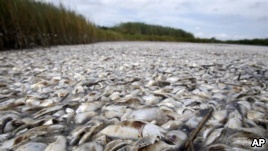VOA慢速英语:研究:密西西比河因大量农药的使用而不堪重负
- 参考译文
- 听力原文
Study: Mississippi River Overwhelmed by Agricultural Chemicals
研究:密西西比河因农药的大量使用而不堪重负
From VOA Learning English, this is the Agriculture Report.
这里是美国之音慢速英语农业报道。
An area known as a dead zone develops every spring in the Gulf of Mexico near the mouth of the Mississippi River. It can spread as much as 13,600 square kilometers, extending all the way to the eastern Texas coast. Scientists know what causes the dead zone -- too much nitrogen, but the solution might be hard to accept.
在墨西哥湾靠近密西西比河河口的地方,每年春天都会变成死水区。它可以蔓延13600平方公里,可以一直蔓延到德克萨斯州东部海岸。科学家知道这片死水区是怎样来的——是因为里面有太多的化学元素氮,但是解决方法可能也很难接受。
Bayani Cardenas is a professor of water studies at the University of Texas at Austin. He says the movement of rivers usually removes material like nitrates. So he wondered why that natural filtration process does not remove nitrates from the Mississippi River.
巴亚妮·卡迪纳斯是奥斯丁德克萨斯大学研究水的教授,他称河流的运动经常会清除一些像硝酸盐类的物质。所以他很好奇为什么自然过滤不能清除密西西比河里的硝酸盐。
Professor Cardenas says his recent study shows that more than 99 percent of the river's water does pass through the river's sediment which is on the shore or bottom of the river. But he says the study found that there is so much nitrogen in the river system that is simply can not filter all of it.
卡迪纳斯教授称,他最近的研究表明,多于99%的河水流经岸边或河底的沉淀物。但是他称研究发现在这条河里有太多氮,这并不是很简单就可以过滤掉的。
The water that has nitrogen still in it supports the growth of algae. As the algae dies, it sinks to the bottom of the river where it breaks down or decomposes. It then takes oxygen from the water. This condition is called hypoxia and it is deadly to fish and shrimp.
含氮的河水也会促进藻类的生长,随着藻类的死亡,这些藻类就会沉淀到河底,然后分解,这样就会消耗掉水里的氧气。这种环境状况叫做缺氧,这对于鱼虾来说是致命的。
Where does all this nitrogen come from? The answer is farms. The Mississippi River system carries water from 33 American states and part of Canada to the gulf of Mexico. Along the way nitrogen and other chemicals used in farming enter the system. Farmers say these chemicals must be used to produce enough food for a growing world population.
这些氮来自哪呢?答案是农场。密西西比河流经美国33个州,还有加拿大到墨西哥湾的部分地区。流经沿途中,农业种植中所用的氮和其他化学成分就会流入河中。农民们称,随着世界人口的不断增长,这些农药必须用于农业种植来获得足够的食物。
Aaron Packman is a professor of Civil and Environmental Engineering at Northwestern University. He says farmers may be able to better control the amount of nitrate fertilizer they put on fields.
亚伦·帕克曼是美国西北大学土木与环境工程系的教授,他称农民可能有能力更好的控制天地中硝态氮肥的使用量。
"How much fertilizer do you need to give you good yields and then how much is maybe a marginal gain from adding lots more fertilizer? There is really a question here: can you maybe [reduce the amount] and get close to the same level of yield without having such a negative impact?" said Packman.
帕克曼说:“你需要使用多少肥料才可以有你好的收成,还有使用大量肥料最多可以获得多少收成?这真是一个问题,或许你减少次肥料的用量也可以获得接近于你想要的收成量,从而又消除了对河流的不良影响呢?”
The water in the Mississippi River system should be able to clean itself naturally as it flows down stream. But flood controls and other human-made structures have hurt this filtering process.
因为密西西比河的水向下流动,它本应该可以自然的净化自己。但是,防洪控制和其他认为建造严重影响了其自滤过程。
Storms in the next few month will mix the gulf water and the dead zone will disappear, but it will return next year. And scientists say it will grow larger in years to come, if something is not done to reduce the amount of nitrogen in the Mississippi River.
几个月以后的暴风雨将会混合海湾里的水,那时死水区将会消失,但是明年它还会形成。并且科学家称,如果在未来几年不能减少密西西比河里的氮含量,这片死水区会变得越来越大。
And that's the VOA Learning English Agriculture Report. I'm Caty Weaver.
这就是本期美国之音慢速英语农业报道的全部内容,我是卡蒂·韦弗。
Study: Mississippi River Overwhelmed by Agricultural Chemicals
From VOA Learning English, this is the Agriculture Report.
An area known as a dead zone develops every spring in the Gulf of Mexico near the mouth of the Mississippi River. It can spread as much as 13,600 square kilometers, extending all the way to the eastern Texas coast. Scientists know what causes the dead zone -- too much nitrogen, but the solution might be hard to accept.
Bayani Cardenas is a professor of water studies at the University of Texas at Austin. He says the movement of rivers usually removes material like nitrates. So he wondered why that natural filtration process does not remove nitrates from the Mississippi River.
Professor Cardenas says his recent study shows that more than 99 percent of the river's water does pass through the river's sediment which is on the shore or bottom of the river. But he says the study found that there is so much nitrogen in the river system that is simply can not filter all of it.
The water that has nitrogen still in it supports the growth of algae. As the algae dies, it sinks to the bottom of the river where it breaks down or decomposes. It then takes oxygen from the water. This condition is called hypoxia and it is deadly to fish and shrimp.
 |
|
Dead pogies float in a fish kill in a pass near Bay Joe Wise on the Louisiana coast, Thursday, Sept. 16, 2010. |
Where does all this nitrogen come from? The answer is farms. The Mississippi River system carries water from 33 American states and part of Canada to the gulf of Mexico. Along the way nitrogen and other chemicals used in farming enter the system. Farmers say these chemicals must be used to produce enough food for a growing world population.
Aaron Packman is a professor of Civil and Environmental Engineering at Northwestern University. He says farmers may be able to better control the amount of nitrate fertilizer they put on fields.
"How much fertilizer do you need to give you good yields and then how much is maybe a marginal gain from adding lots more fertilizer? There is really a question here: can you maybe [reduce the amount] and get close to the same level of yield without having such a negative impact?" said Packman.
The water in the Mississippi River system should be able to clean itself naturally as it flows down stream. But flood controls and other human-made structures have hurt this filtering process.
Storms in the next few month will mix the gulf water and the dead zone will disappear, but it will return next year. And scientists say it will grow larger in years to come, if something is not done to reduce the amount of nitrogen in the Mississippi River.
And that's the VOA Learning English Agriculture Report. I'm Caty Weaver.
- 频道推荐
- |
- 全站推荐
- 推荐下载
- 网站推荐




















